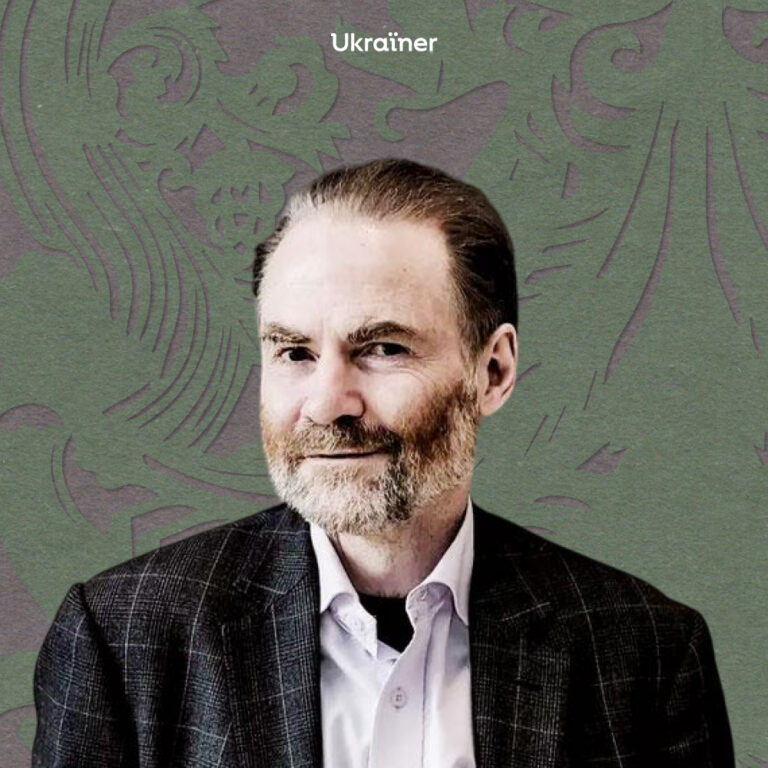This episode of the Decolonisation series features Timothy Garton Ash, a distinguished British historian, author, and commentator renowned for his extensive work on modern European history, particularly in relation to post-communist Europe.
In this interview, Professor Ash shares insights from his latest book, Homelands: A Personal History of Europe, where he reflects on political transformations from the mid-20th century to the present. He offers a unique perspective on shared European history, discusses the concept of intra-European Orientalism, and explains why Ukraine’s integration into the broader European consciousness has been more dramatic than that of other Central European countries.
In your recent book, Homelands: A Personal History of Europe, you blend historical analysis with personal experiences of major events from the mid-20th century to the present. Could you share how you determined which events were the most significant to include in the book?
That book took me only 50 years to write — 50 years of travelling across Europe, witnessing historic events, meeting fascinating people, studying Europe through more conventional means, and recording it all in my notebooks. On one hand, it’s a record of the remarkable things I’ve seen and heard over the past half-century; on the other, it captures events of real significance for Europe’s history. The best moments are when these two aspects converge. For example, I describe meeting Vladimir Putin in 1994, when he was still the deputy mayor of Saint Petersburg. Even then, he was already speaking of territories he claimed were “always Russian” but now lay outside the Russian Federation, specifically mentioning Crimea. He said, “There are 25 million Russians outside the Russian Federation, and we have a duty to look after them.” This is a personal anecdote, yet it holds enormous historical weight as an early glimpse of the revanchist drive that has pushed Putin to try to rebuild the Russian Empire. As for the structure of the book, I identify two overlapping eras: the post-war period, beginning in 1945, and what I call the “post-wall period”, which started with the fall of the Berlin Wall. My argument is that the “post-wall period”, which began with the Wall’s fall on 9 November 1989, actually came to an end on 24 February 2022, with Putin’s full-scale invasion of Ukraine.
You notably begin with your father’s participation in D-Day and end with the full-scale war against Ukraine. Did you choose this beginning and ending as a metaphor, or is there a more direct connection for you?
It was clear to me that I had to start in 1945 — you can’t understand today’s Europe without going back to the Second World War. My father landed in the first wave on D-Day during the Normandy invasion and fought his way through to Germany. I revisit those places: the landing site in Normandy, the French village, and the German town he was in when the Western Allied Forces reached Northern Germany. But when I began writing the book five or six years ago, the full-scale war had not yet erupted. I had a strong sense, though, that things in Europe were going wrong. We’d already had 2014, the migration crisis, COVID, Brexit — all kinds of challenges. Still, I had no idea that we’d face the largest war in Europe since 1945. As I worked on the book, that war broke out, and I began travelling to Ukraine again after the invasion. It then became clear that the story had to be framed by the Second World War at the start and the biggest European conflict since then at the end.
D-Day
The largest seaborne invasion in history on 6 June 1944, when Allied forces launched a massive invasion of Nazi-occupied France during World War II.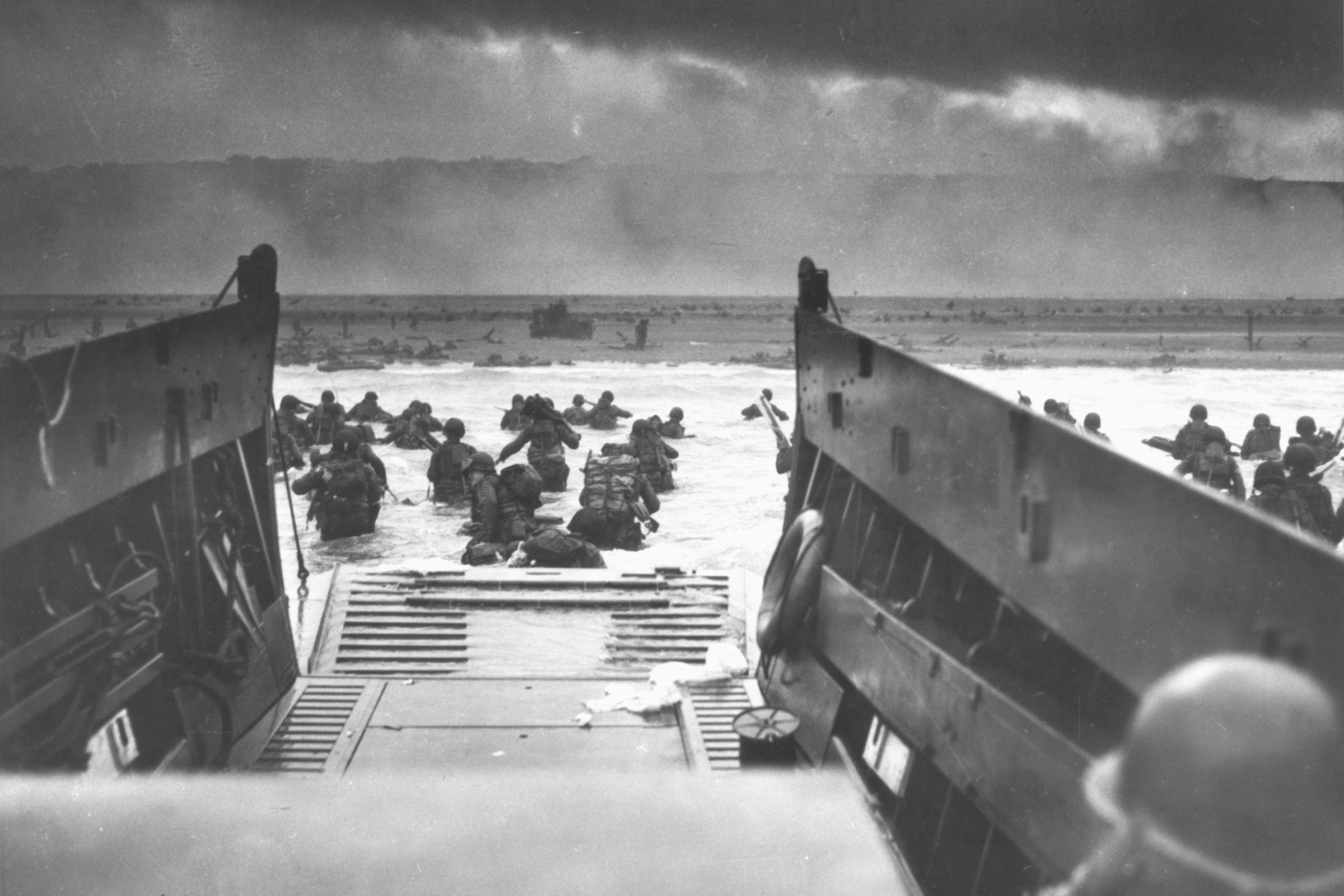
U.S. Army troops wade ashore on Omaha Beach during the D-Day landings, 6 June 1944. Author: Robert F. Sargent, U.S. Coast Guard
For many years, I found it difficult to read books about Central and Eastern Europe, particularly Ukraine, by historians from outside the region. There was often something fundamentally off in how Ukraine was portrayed. Your book, however, genuinely feels different. It presents Europe as a whole, acknowledging a shared history that spans countries like Poland, Hungary, and Ukraine, reaching right up to Russia’s border. Why did you choose to give European history this broader perspective, which might seem obvious but is rarely articulated in this way?
There are two main reasons — one personal and the other historiographical and political. Personally, Central and Eastern Europe shaped my most formative political experiences. I started out travelling and living in East Germany, where I was even spied on by the Stasi (East Germany’s secret police agency – ed.). My first book in English covered the Solidarność movement in Poland in 1980-81. I came to know great Central and Eastern European dissidents like Václav Havel (a Czech dissident who played a key role in opposing communist rule in Czechoslovakia – ed.) and Adam Michnik (a co-founder of the Solidarność movement, leading anti-communist resistance in the 1980s Poland – ed.), and I documented the liberation of Central Eastern Europe and later the Baltic states, Ukraine, and others from 1989 to 1991. So, this region is central to my life, and it’s also crucial to understanding Europe.
Solidarność (Solidarity)
Was a Polish trade union and social movement founded in 1980, advocating for workersє rights and democratic reforms. It became a powerful force against Poland's communist regime, helping to inspire the fall of communism across Eastern Europe.This book, as part of a larger process, allowed me to address Europe as a whole. Rediscovering the balance between Western and Eastern Europe helps restore equal importance to each in our understanding of the continent. Norman Davies, for instance, wrote Europe: A History in the mid-1990s, which, to my knowledge, was the first work to give Eastern and Western Europe roughly equal weight — though not fully integrated. Tony Judt’s Postwar takes it a step further by starting to bring them together, and my aim here was to take the next step, making them self-evidently interwoven. Ultimately, I think we need to move beyond simplistic categories, recognising one Europe in all its complexity and diversity, as well as its deeper unity.
There’s a lot of discussion about which countries belong to Central Europe versus Eastern Europe, and it often feels confusing. What criteria should we use to make this distinction?
Well, the centre keeps shifting. But it’s useful for people to see Ukraine as part of Central Europe because that, in itself, represents a psychological shift. Central Europe, and the idea of Central Europe in the 1980s and 1990s, was like a ferry crossing from one bank of a river to the other. It was a ferry on which countries like Poland, Czechoslovakia, and Hungary moved from the political East to the political West. And, of course, that’s what is happening with Ukraine now. So, it’s a good ferry to be on, even if the definition remains elusive.
As you mentioned earlier, your book discusses former Czechoslovakia, Poland, Hungary, and East Germany during the communist period, drawing on both professional and personal experiences in these countries. For those who may not be very familiar with this history, how would you describe life in these nations before they freed themselves from communism?
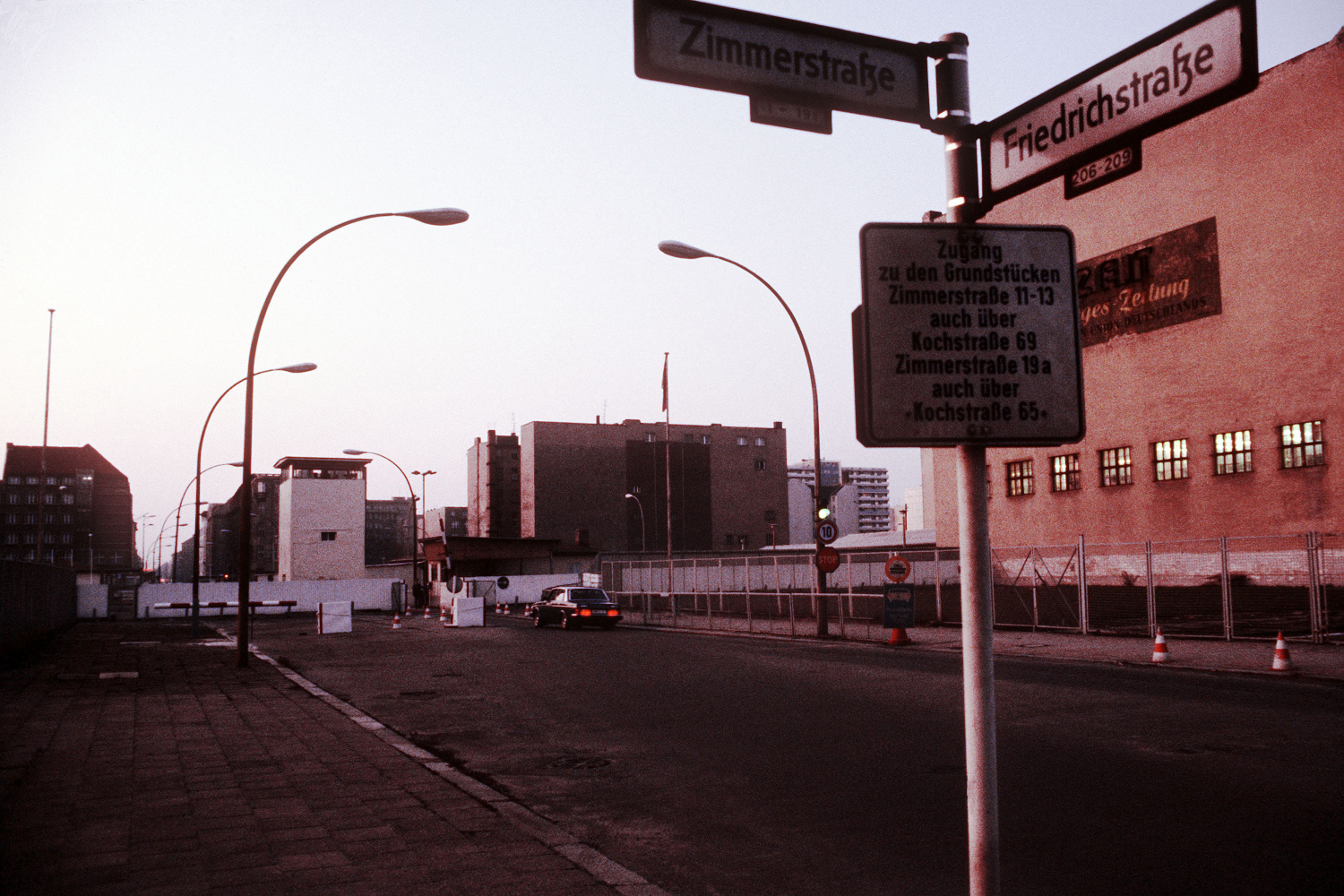
A view of Checkpoint Charlie, the border crossing for diplomats and Allied personnel between East Germany and West Germany. Author: Master Sergeant Don Sutherland.
It’s important to understand this because, during the Cold War, people in the West lived with their backs to the Iron Curtain and the Berlin Wall. It was as if Siberia began at Checkpoint Charlie (a famous crossing point between East and West Berlin during the Cold War – ed.), right? They knew very little about these countries, so learning more about where other Europeans come from is valuable. But beyond that, I would say the experiences of these countries help you understand how dictatorships operate — how subtle and insidious the mechanisms can be that allow them to control their people. Unlike today, where it’s clear that Ukraine is under constant bombardment from missiles, bombs, and drones, it wasn’t immediately obvious that you were living under a totalitarian or post-totalitarian regime. However, the mechanisms of control, such as the Stasi secret police, were subtle yet equally effective. So, I think understanding how dictatorships exploit human weaknesses and how it can happen to anyone is crucial.
You draw fascinating parallels between events in both regions, particularly among the ’68 generation. Across Western Europe, from West Germany to France, various movements were championing anti-colonialism and the sexual revolution, yet many were ideologically aligned with communism. Why do you think that, even in the late ‘60s — despite the well-known atrocities of the USSR — communist ideas remained so popular in the West?
The year of 1968 was the most significant year between 1945 and 1989. In Prague, during the Velvet Revolution in 1989, as I recall in the book, there were hand-painted posters showing ‘89 as ‘68 upside down. The anti-authoritarian attitudes and the focus on inequality and emancipation were widespread. Daniel Cohn-Bendit (a French-German politician and former leader of the May 1968 protests in France – ed.), one of the key figures of ‘68, said at one of the anniversaries, “We succeeded socially and culturally, and thank heaven, we failed politically.” I think that’s accurate. A Ukrainian ‘68er and a Polish ‘68er shared something in common with their Spanish or French counterparts, but the politics were entirely different. The ‘68ers in Central and Eastern Europe wanted what we in the West already had: social democracy, liberal democracy, and some version of Western liberal values. The ‘68ers in Western Europe, on the other hand, were still clinging to ideals of socialism, not necessarily the Soviet system but something with a great deal in common with real-existing socialism. As a result, there was a total breakdown in communication between Paris and Prague. When Adam Michnik went to Paris, his political position was incomprehensible to many there. Similarly, when some of the West German ‘68ers visited Prague or Warsaw, there was complete confusion because they were speaking the language of dictatorship. Fortunately, by 1989, we had moved beyond that divide.
In the book, you say, “Fortunately, the political ideas of the ’68 generation in the West ultimately failed,” so we should consider ourselves lucky.
Unfortunately, they failed in the East. The events of ‘89 might have happened in ‘68 if we had remembered that Dubček’s idea of socialism with a human face had at least the potential for further evolution. That could have spared much of the region, though not necessarily the Soviet Union, another 20 difficult years.
I realised that the Ukrainian generation of the 1960s has a slightly different story and set of circumstances. This was a generation of Ukrainian intellectuals who revived national cultural ideas in Ukraine. I’m curious whether the Ukrainian ‘60s generation is included in the broader discussion in Western academia about the 1960s and the transformations of that era.
I have a shelf full of books on 1968, and Ukraine is hardly featured at all, which sadly reflects the ongoing Western condescension towards the East. However, my good friend Yaroslav Hrytsak, the outstanding Ukrainian historian, whom I think represents that generation, is recognisably a ‘68er in many ways, particularly in his social and cultural attitudes. But at the same time, the agenda — focused on national cultural and political revival — is very different. In that sense, the Ukrainian ‘68 had more in common with 1848. The key point of 1848 was that liberalism and nationalism walked hand in hand, and that was a strange idea for Western liberals in the 1990s or 2000s. This is one of the things that Ukraine has contributed to our understanding.

Yes, the circumstances in which Central Europe and Ukraine existed were quite different. While reading your book and works like Café Europa by Slavenka Drakulić, I thought about life in Soviet-occupied Ukraine. Drakulić describes how people from former Yugoslavia, travelling to Western Europe, were often mistrusted. Meanwhile, Ukrainians were effectively in a lockdown, unable to travel. Do you think these differences — despite both regimes being highly authoritarian — affect how people from Croatia or Poland are perceived in Western Europe compared to Ukrainians?
There is still what I call “intra-European orientalism”, a lingering Western tendency — particularly in countries like France and Spain — to view Eastern Europe as backward, exotic, authoritarian, and not fully European. Gonzague de Reynold (a 20th-century Swiss historian, promoting a strong national identity – ed.) once referred to Western Europe as “European Europe”, implying that the rest of Europe was somehow not truly European. These prejudices, rooted in the Enlightenment, still persist. However, what has shifted these perceptions has been the agency of Central and Eastern Europeans themselves, particularly in times of crisis. For Czechoslovakia, 1968 was a turning point when people began reading Czech literature seriously as part of the European conversation. Poland’s 1980-81 Solidarność movement, the 1989 revolution, and later the works of authors like Slavenka Drakulić (a Croatian author, known for her reporting on the Yugoslav Wars and post-communist transition in Eastern Europe – ed.) gained wider attention, especially during and after the Yugoslav Wars (a series of ethnic and territorial conflicts that took place from 1991 to 2001 following the breakup of Yugoslavia – ed.). For Ukraine, the process has been more gradual.
While 1991 marked the beginning, the 2004-2005 Orange Revolution put Ukraine on Europe’s map. The 2014 Maidan protests further solidified Ukraine’s European identity, but the real turning point came in 2022. Now, there is no doubt in most European minds that Ukraine belongs as much to Europe as countries like Croatia, Norway, or Ireland. However, cultural recognition does not automatically translate into full political recognition. Despite the strong cultural acknowledgment, Ukraine risks being stuck in a waiting room, much like North Macedonia, which has been an EU candidate since 2005. So, while cultural recognition is crucial, it doesn’t guarantee swift political integration.
The Orange Revolution
A wave of mass protests in Ukraine in late 2004, triggered by electoral fraud in the presidential election that falsely declared pro-Russian Viktor Yanukovych the winner. The protests forced a re-run of the election, leading to the victory of pro-EU Viktor Yushchenko and a significant shift toward democratic reforms.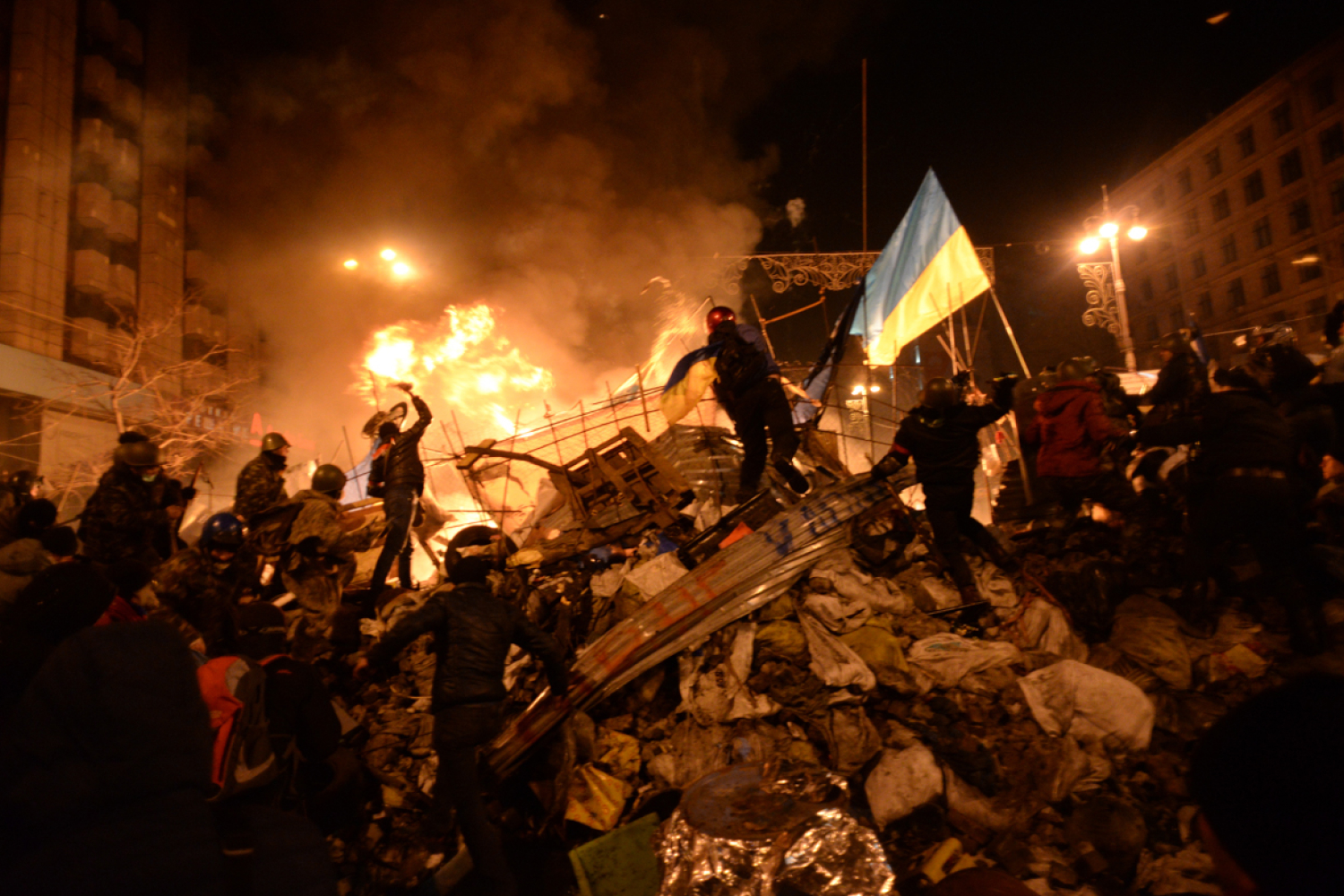
State flag of Ukraine behind a wall of anonymous protesters in Kyiv, Ukraine. Events of February 18, 2014. Author: Mstyslav Chernov.
You mentioned a few names, and I was also thinking about authors like Kundera with The Kidnapped West, Czeslaw Milosz, and others who had already described the imperial Russian influence over the region. Who were the voices throughout the 20th and 21st centuries that helped bring Eastern and Central Europe onto the broader political and cultural agenda?
I mentioned Norman Davies, my former student Timothy Snyder, Anne Applebaum, and others from our side who were part of that conversation. For instance, Czesław Miłosz from Poland, Václav Havel from Czechoslovakia (and later the Czech Republic), and György Konrád (Hungarian writer known for his exploration of the oppressive nature of totalitarian regimes and his advocacy for democratic reform – ed.). Now, I believe a new generation of Ukrainian intellectuals is joining that effort to explain and make connections.
When we look at Eastern European or Slavic studies at various universities in Europe, how would you evaluate them? We often see a solid Russian influence or perspective still present. As someone in academia, how do you view this?
This is a significant problem because, particularly in universities, there is a tremendous inertia or time lag. To this day, many academic programmes are still structured around something called “Russian and East European Studies” — a legacy of the Cold War that also reflects outdated intra-European orientalist stereotypes. At Oxford, we’ve made notable progress, and I’m pleased to say our European Studies Centre now considers Europe as a unified whole. However, this remains a persistent issue regarding Ukraine. I often say that structuring European studies as “Russian and East European Studies” 35 years after the fall of the Berlin Wall is akin to studying “German and East European Studies” in the 1970s or “Ottoman and South European Studies” in the late 1930s. The time lag is quite remarkable. It is changing, but slowly, because there are established structures, courses, academic posts, funding streams, and inherent biases, which all take time to shift. The key to accelerating this change will be to secure endowed chairs in Ukrainian studies, as permanent professorships or lectureships reshape academia. They bring with them research projects, students enrolled in specific courses, visiting fellows — the entire academic ecosystem. If there’s one thing I hope results from this surge of interest in Ukraine, it’s the creation of permanent posts. Otherwise, the risk is that interest will prove ephemeral: every publisher releases one or two Ukrainian books, every film society screens a few Ukrainian films, there are some high-profile events, and then, within five years, it all fades away.
Do you think we need to provide specific incentives for students to enrol in these studies, or is there interest already?
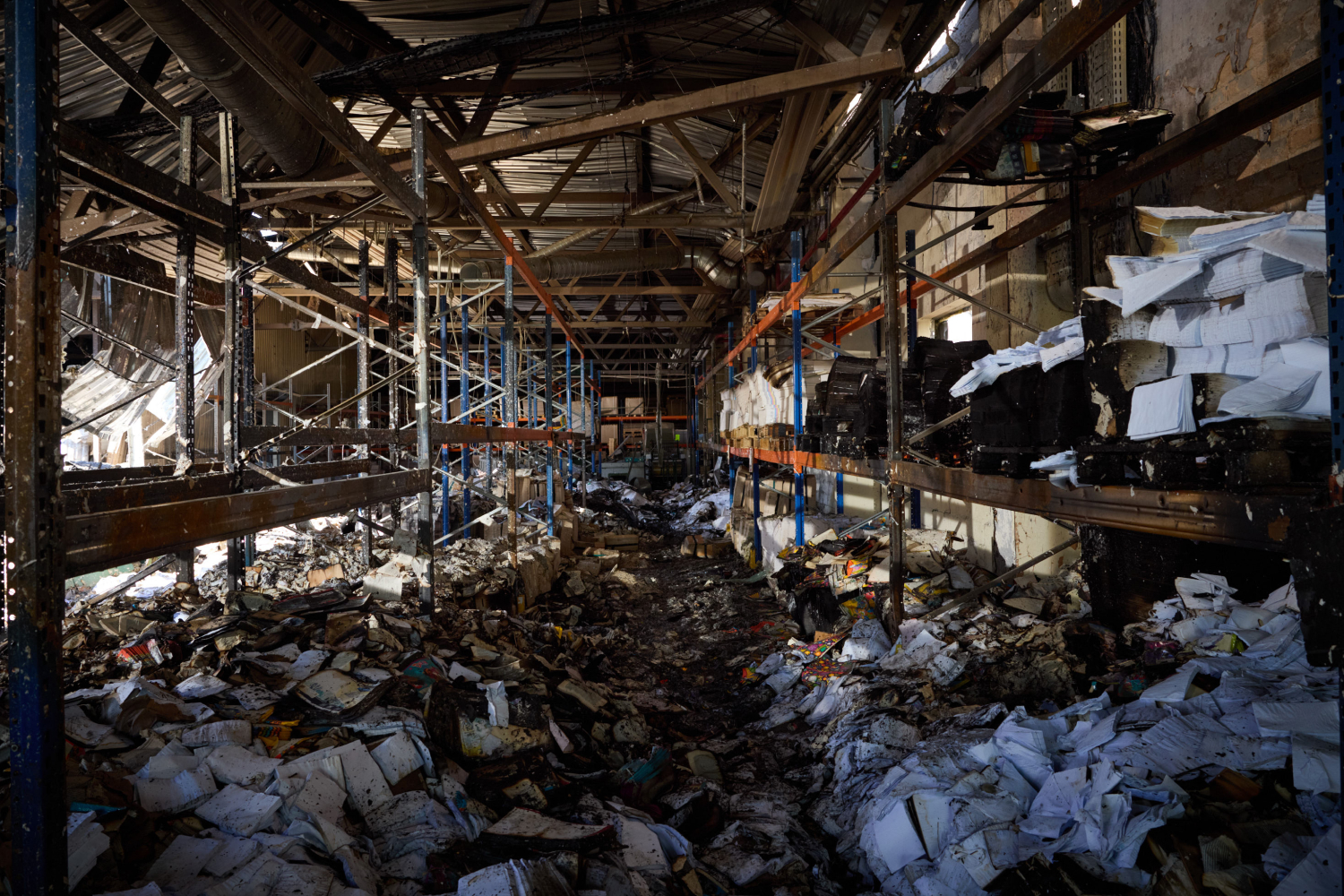
The destroyed Factor-Druk printing facility. Photo by Press Service Of The President Of Ukraine.
The interest is there, but to start with, there’s hardly anyone to teach Ukrainian. I mean, there’s just a tiny handful of people at British universities — two chairs in Ukrainian studies and only a few places where Ukrainian can be learned. If the courses aren’t on offer, students won’t come. So I think that if you get the supply side right, the demand will follow. But let me add a little remark here. I understand, and I’ve seen it myself several times when visiting Ukraine in recent years, why people reject everything Russian. I was in Kharkiv just four weeks ago, visiting the printing house where my book Homelands was published in Ukrainian by Vivat. The Russians bombed the printing house (in May 2024, a Russian missile attack targeted one of Ukraine’s largest printing facilities – ed.); seven people were killed, and 21 wounded. I spoke with one of the survivors, who told me in Russian, “I want Russia wiped from the face of the earth — no more Russia, no more Putin.” I understand that feeling. But I’d suggest focusing on a positive case for Ukraine — its history, culture, and political journey. We need to get people interested in Ukrainian writers, rather than focusing too heavily on denouncing Pushkin, Tolstoy, and Dostoevsky. You may have valid points, but you’re unlikely to gain as much sympathy in the West that way. Making a positive case for Ukraine, rather than only condemning everything Russian, is what’s needed.
It’s also crucial to understand that, at its core, this is a neo-colonial war and that Ukraine’s experience has been one of colonialism. This historical context is vital, and one way to explain it is by noting how Kharkiv’s Pushkin Street was once called German Street until 1899, when it was renamed to mark the 100th anniversary of Pushkin’s birth (a Russian poet, regarded as the founder of modern Russian literature and the national poet of Russia – ed.). This renaming was an act of imperial symbolism, much like how streets in former British colonies, such as Victoria Street in Australia, New Zealand, and some African cities, were named to reflect imperial power. People need to grasp this historical perspective and use it to make a positive case for Ukraine.
Yes, because the kind of decolonisation we’re experiencing internally in Ukraine is one thing, but there’s also a much larger external conversation, and it’s a different matter altogether.
I’ve been reflecting on the colonial and decolonisation narrative. Your biggest challenge now is no longer in the West — many people there understand the situation much better than before 2022. The real issue lies in the rest of the world. Take India, for example: explaining to them that this is a neo-colonial war is difficult, as they often view colonialism as something imposed by the West, especially by white Europeans. Many, rightly or wrongly, saw the Soviet Union and Russia as allies in their own anti-colonial struggles. Convincing them that this is actually a colonial war is a far harder task. And, frankly, the last person who can effectively communicate that is a Brit or a Frenchman, given our colonial history. But Ukrainians, Slovenes, or Slovaks, who were the objects of colonialism by other Europeans, have a better chance of getting that message across.

You recently published an article in the Financial Times titled “Only NATO Can Secure a ‘West Germany’ Future for Ukraine”. I find it fascinating how historical context can shed light on contemporary issues. Could you elaborate on the ideas you explored in this article and explain why you believe the war is also crucial to the process of decolonisation?
The term “West German” was deliberately quoted in the headline. This is something that has been widely discussed, and I wanted to point out that all historical comparisons are useful for the similarities and differences they reveal. And in this case, the differences are huge. Germany was divided because Nazi Germany started the war. If Ukraine is to be split territorially, at least for the foreseeable future, it will be because Russia started the war. Nazi war criminals were tried at Nuremberg. Unfortunately, it is highly unlikely that Putin and his henchmen will face a trial any time soon. So there’s a massive difference in the historical starting point.
The Nuremberg Trials
A series of military tribunals, held from 1945 to 1949, to prosecute prominent leaders of Nazi Germany for war crimes, crimes against humanity, and crimes against peace.My theory is that people in the West will use the West German analogy as a kind of fig leaf to justify retreat and avoid giving sufficient support to ensure an independent, democratic Ukraine with a viable future. What has become clear to me is that what Ukraine needs is not just the EU but NATO, or NATO-level security. Without that kind of security, Ukraine won’t get the foreign investment needed for reconstruction. You won’t get millions of Ukrainians returning to rebuild the country. Without that security, many Ukrainians will feel Ukraine hasn’t won the war and hasn’t emerged victorious. And I think that would lead to a very bitter politics of recrimination. So what I’m trying to do is to hold the West, starting with the United States, and followed by Germany, France, and Britain, accountable. I’m saying: if this analogy with West Germany, which of course then had a perfect future, is not to become a bad joke, this is what you need to do — NATO as well as the EU.
There’s a lot of speculation around the concept of peace. From a historical perspective, can you explain what peace truly is and what it needs to be in order to be lasting and sustainable?
There’s a beautiful poem by a Polish poet who says there are all these competing definitions of freedom. But every day, he says, I know what an absence of freedom is. So, I’ll tell you what peace is not. Peace is not simply the temporary absence of war. It’s not the temporary absence of outright hot war or fighting. And this is a great mistake in the whole discussion about getting to “peace in Ukraine at the moment”. A peace in which Ukraine was not secure would not last. It would just be a temporary pause in the fighting. And Putin would regroup, rearm and then have another go. And so peace is more than just the absence of war. It’s a stable state in which countries live side by side in security. And with a clear prospect that security will endure. That’s what we mean correctly by peace. And to get there, sometimes, once deterrence has broken down, once appeasement has failed, and that is the case here, the first thing you have to do is to win the war.


